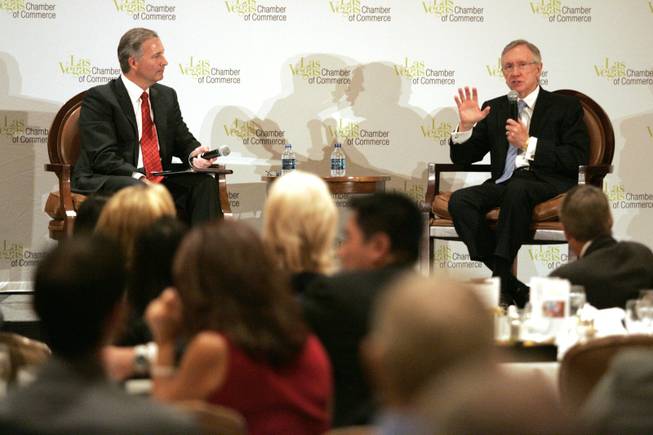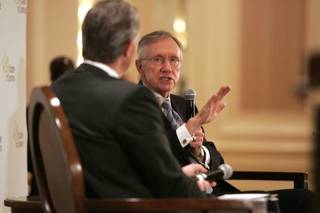
Sen. Harry Reid answers a question from Steve Hill at a Las Vegas Chamber of Commerce luncheon Wednesday at the Four Seasons.
Friday, Aug. 28, 2009 | 2 a.m.
Sun Archives
- At Chamber meeting, Harry Reid plays to the center (8-26-2009)
- Harry Reid, John Ensign approval sinks as health care debate continues (8-24-2009)
- Republicans want to make Reid’s town hall the issue (8-21-2009)
- Wall Street Journal: Reid will be judged on health care (8-19-2009)
- Reid releases details of 'tele-town hall' meeting on health care (8-18-2009)
Sun Coverage
Sun Blogs
Senate Majority Leader Harry Reid is often hesitant during the health care debate in Washington to express his personal views, but he let down his guard a bit this week in Nevada.
Reid opened a private meeting of health care providers in Las Vegas on Tuesday by saying, according to one attendee who took notes: “We have a problem in America and it’s called the private insurance industry.”
Reid went on to express support for a public option, the proposed government-run insurance plan that he compared to Medicare, saying any meaningful reform legislation would have to include a public component.
Nevada’s main progressive group said the majority leader’s comments during Tuesday’s meeting of about 20 hospital CEOs, doctors and other health care providers was among the most significant statements they have heard on his thinking.
“We’re energized and we’re also confident that Sen. Reid is on the right side on this issue,” said Michael Ginsburg, a community organizer at the Progressive Leadership Alliance of Nevada, who attended the meeting. “That’s something we can take to our supporters and reassure them.”
Reid has been traveling throughout the state talking to constituents about health care and other issues while Congress is on summer recess.
The senator has declined to host a public town-hall meeting on health care, criticizing as “Astro Turf” — a political term for corporate-sponsored campaigns made to appear like spontaneous uprisings — the protests being organized by groups opposed to health care reform. He has called those who are shouting down elected officials elsewhere across the country “evil mongers.”
Instead Reid will host a telephone town-hall meeting this afternoon, hoping to reach as many as 50,000 Nevadans. The deadline has passed to register for the call.
But in settings with voters over the past few days in Nevada, Reid has shared his thoughts.
“Clearly he is not enamored of the insurance industry,” said Dr. John Ellerton, a physician in private practice who attended the meeting.
Tuesday’s meeting was described by one attendee as a who’s who of the Nevada medical establishment. The group held diverse views and engaged in a healthy exchange with the senator for about 75 minutes, attendees said.
Reid spoke about his preference for the public option.
Reid has previously said he personally backs the public option, which supporters believe would drive needed competition among health insurance companies but detractors say would put some of those companies out of business.
But last month, Reid declined to say whether he would push for the public option during a press briefing in Washington where, as majority leader, he traditionally gives great deference to the committee chairmen as legislation is being formed, and often declines to influence their committee debates.
“It would be really premature for me to lay out for each of you what I think should be in this bill,” Reid said in July.
Reid also spoke Tuesday of the difficulty of getting the public plan component approved in the Senate, where he hopes to attract Republican support. With the death of Sen. Edward Kennedy, D-Mass., Reid has 59 senators in his caucus, not the supermajority of 60 often needed to pass significant legislation.
At both the Tuesday meeting and again during a Wednesday luncheon hosted by the Las Vegas Chamber of Commerce, Reid mentioned the possibility of using the procedure known as reconciliation to pass the health care bill in the Senate with just 51 votes. But he also noted the shortcomings of that approach, explaining to both groups that only part of the bill could be handled with reconciliation, leaving important elements behind.
Reid spoke at both venues about the antitrust exemptions health insurance companies have enjoyed for decades as part of the problem with the industry.
Yet Reid’s comments became something of a Rorschach test — with listeners reaching different conclusions based on their positions on the issue.
Take medical malpractice reform.
Some health professionals argue that medical costs are driven up by those who practice so-called “defensive medicine” — that is, doctors ordering unnecessary tests on patients to cover themselves in the event of lawsuits. Republicans have seized on this issue, arguing it’s time to change malpractice law and rein in trial lawyers.
At the Tuesday meeting, Reid told health care providers the story about a surgery he needed some years ago on his left foot. As he was in the hospital preparing for the operation, he asked what the markings on his right foot signified.
He was told they marked the foot to be operated on.
Reid told the staff they had marked the wrong foot.
Ginsburg took this to mean Reid had no tolerance for the kinds of tort reform being suggested by some of the doctors in the room as a way to rein in medical costs.
However, Dr. Ronald Kline, president-elect of the Nevada State Medical Association, was struck by Reid’s interest in medical review panels that once functioned in Nevada — panels that would review lawsuits and render nonbinding decisions about the merits of a case that supporters say can reduce the number of lawsuits going forward. The panels were disbanded a few years ago in Nevada.
“It was like an evolution of his thought,” Kline said.
On Wednesday, Reid repeated his interest in the medical review panels as he retold the story about his mismarked foot to the chamber crowd.
Different listeners walked away with different understandings of what they thought would happen next in Washington, a symptom of a bill that remains a work in progress.
Yet several said they understand legislation is coming.
“I think his intent is to have something,” Ellerton said. “I think come hell or high water there’s going to be a bill. That was very clear — that Harry wants something done.”


Join the Discussion:
Check this out for a full explanation of our conversion to the LiveFyre commenting system and instructions on how to sign up for an account.
Full comments policy